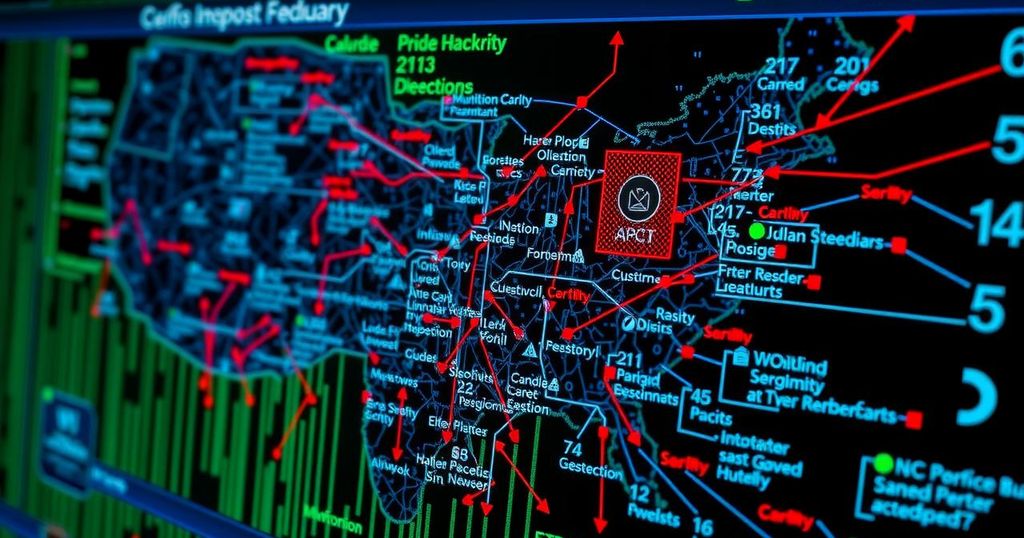Iranian hackers linked to the Iranian government have been probing election-related websites in critical U.S. swing states in search of vulnerabilities, as revealed by a Microsoft report. U.S. intelligence officials are expressing concern over these actions, which may coincide with broader efforts to influence the 2024 presidential election amid rising tensions regarding perceived electoral integrity.
Recent reports from Microsoft indicate that Iranian hackers, linked to the government, have been actively investigating election-related websites across several key U.S. states, a move that raises concerns about potential vulnerabilities ahead of the presidential election. This activity was identified in April but only publicly disclosed recently by Microsoft analysts, who also noted that these hackers had conducted online reconnaissance of major U.S. media organizations in May. U.S. intelligence agencies view these actions as part of Iran’s ongoing strategy to create division around the forthcoming election. They have observed similar hacking efforts targeting the campaign of former President Donald Trump, as well as attempts to incite protests regarding U.S. policy towards Israel. Microsoft analysts believe that the Iranian hacking group, referred to as “Cotton Sandstorm,” is likely to intensify its operations as the election approaches, following a pattern of previous interference attempts. Despite uncovering evidence of probing activities, officials confirm there has been no escalation to full-scale hacking attempts on the election websites, which are considered secure due to multiple protective measures in place. However, the potential threat to public confidence in the electoral process remains significant. This concern is compounded by the recent activities of other foreign entities, notably Russian groups spreading disinformation and utilizing social media platforms to undermine trust in democratic institutions. The implications of these hacking efforts are notable. Analysts fear that leaking publicly available voter registration data may further exacerbate fears about election integrity among the American populace. Furthermore, evidence suggests that similar Iranian operations in the past have directly aimed at influencing voter behavior and threatening electoral security. Notably, the same group had attempted to impersonate a far-right organization to intimidate voters during the 2020 election cycle. While China has not engaged in direct electoral influence operations similar to Iran or Russia, it has been implicated in social media campaigns targeting various congressional and state races. The overarching analysis, according to Chris Krebs, the former head of the Cybersecurity and Infrastructure Security Agency, indicates that while these foreign actions may be persistent nuisances rather than decisive game-changers, they are nonetheless impactful and should be anticipated by the voting public, who must navigate an increasingly complex information landscape leading up to the election.
The context surrounding this report is situated within a broader understanding of cybersecurity threats faced by electoral processes in the United States, particularly as the nation approaches a pivotal presidential election. Historical cybersecurity breaches, such as those observed during the 2020 elections, inform current apprehensions regarding foreign interference attempts by various state-sponsored hacking groups—including those from Iran, Russia, and China. The U.S. government’s vigilance in monitoring these cybersecurity threats highlights the ongoing risks to election integrity, public trust, and national security. This backdrop underscores the significance of the findings disclosed by Microsoft and the responses from federal agencies.
In conclusion, the reconnaissance activities conducted by Iranian hackers targeting U.S. election-related websites serve as a stark reminder of the evolving challenges posed by foreign adversaries ahead of the 2024 presidential election. While these activities have not progressed into active hacking attempts, their existence raises substantial concerns regarding voter confidence and the potential for misinformation. Given the precedents established during previous elections, both elected officials and the public must remain alert to the ramifications of such espionage activities and collectively advocate for sustained cybersecurity measures to protect the electoral process.
Original Source: www.cnn.com






